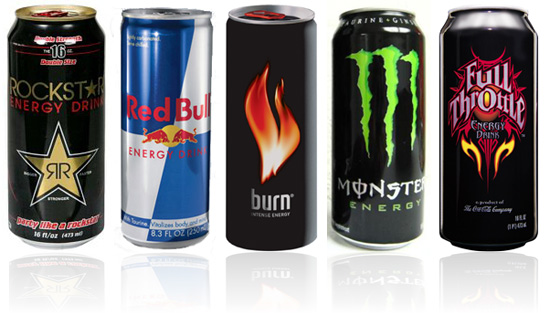As semester final projects approach and students begin to study for exams, many are looking for an extra edge to defy their body’s needs and forego sleep and proper nutrition. These are essential to optimum function, health and mood balance, yet students still look to the aid of energy drinks and other caffeine sources that may not be ideal choices when dealing with either personal or academic stressors.
Recent articles have emerged that place energy drinks under the same lens of scrutiny as sports drinks have been under in the past. In a New York Times article by Barry Meier, titled, “F.T.C. Urged to Review Energy Drink Advertising,”concern is raised regarding energy drink related deaths, health dangers and the fact the drinks are being marketed to youth.
“Newsday reported this week that the Suffolk County Board of Health on Long Island urged county lawmakers to ban the sale of energy drinks to people younger than 19. The board cited potential health dangers that have been associated with the drinks, including elevated heart rates and higher blood pressure, dizziness and possible death,” the article stated.
These are not the only side effects of energy drinks, however. Other consequences one may experience include shaking, restlessness, palpitations, upset stomach, chest pain and headaches according to an article on EnergyFiend.com, a website devoted to exploring the benefit and detriment of using caffeine.
One can find the reality of these symptoms in the filings against 5-Hour Energy with the F.D.A. cited in another New York Times article by Barry Meier titled, “Caffeinated Drink Cited in Reports of 13 Deaths.”
“Since 2009, 5-Hour Energy has been mentioned in some 90 filings with the F.D.A., including more than 30 that involved serious or life-threatening injuries like heart attacks, convulsions and, in one case, a spontaneous abortion,” the article stated.
The ingredients in energy drinks are the cause of many of their side effects, according to “Harmful Side Effects: straight talk about the downside of energy drinks,” by EDrinks.net. Especially when a drink is high in carbohydrates and caffeine, the high percentage of carbohydrates makes it difficult for the blood to absorb nutrients, therefore the energy gain may be reduced.
The website also notes the detrimental effects of caffeine on concentration, not to mention other effects such as reduced coordination, balance and ability to get restful sleep.
“Too much of this stimulant [caffeine] can cause an irregular heartbeat, excess sweating, jitters and anxiousness, which is hardly ideal if you want to concentrate for an exam,” the article said.
In the face of the questionable health status of energy drinks as related deaths continue to be investigated, there are other solutions for students in a time-crunch. The simplest solutions are lifestyle improvements such as sleeping, practicing stress reduction techniques and eating intentionally. Beyond finding an extra twenty minutes to nap or meditate, both valuable destressors, nutrition is key in maintaining health and improving one’s ability to function.
According to August McLaughlin’s article, “Foods that Help Improve Concentration and Energy,” Vitamin B6 foods and omega-3 fatty acids are both essential to the equation. Food sources rich in vitamin B6 include fortified cereals, bananas, potatoes, spinach and salmon. Consumption of these foods is critical to improve concentration and memory as well as to generate mood-improving chemicals such as serotonin, dopamine and norepinephrine.
Omega-3 fatty acids are also important because they aid memory ability and improve mood balance. Omega-3 fats can be found in salmon and tuna as well as flaxseed, walnuts and canola oil.
A Newsweek article, “Stronger, Faster, Smarter,” suggests another simple and important tool to achieve better concentration and a sharper mind: exercise. Incorporating more physical activity into your daily routine can bring the benefits of higher oxygen levels in blood flowing to the brain and higher levels of neurotransmitters, not to mention denser webs of nerves to communicate messages in the brain more quickly.
“Dopamine, serotonin, norepinephrine—all of these are elevated after a bout of exercise,” Harvard psychiatrist John Ratey said. “So having a workout will help with focus, calming down, impulsivity—it’s like taking a little bit of Prozac and a little bit of Ritalin.”
In under an hour one can improve their brain function and overall health. Most importantly, with continued exercise and maintained fitness one may compound these benefits to prove even more effective. With healthy eating alternatives and regular exercise—the tenets of a healthy lifestyle—one can achieve the benefits of concentration and higher brain function without running the risks associated with energy drinks or ingesting empty calories that provide little nutrition value.

Good information I will start ignoring these energy drinks, I think beer is better option
Website Development Company in Dwarka
Great info
I will be sharing this well done article
Regards las-vegas-lawyers.net